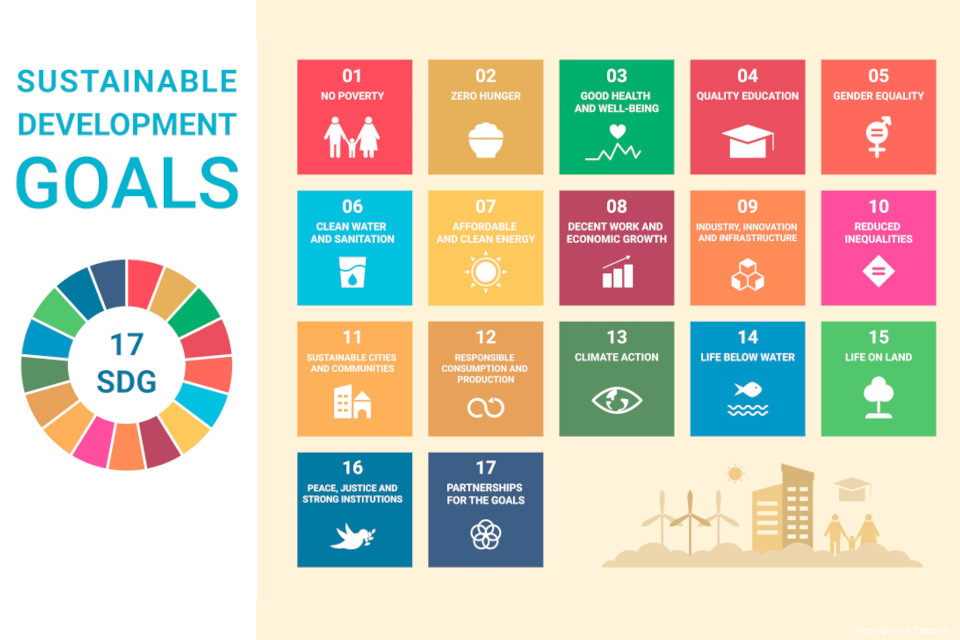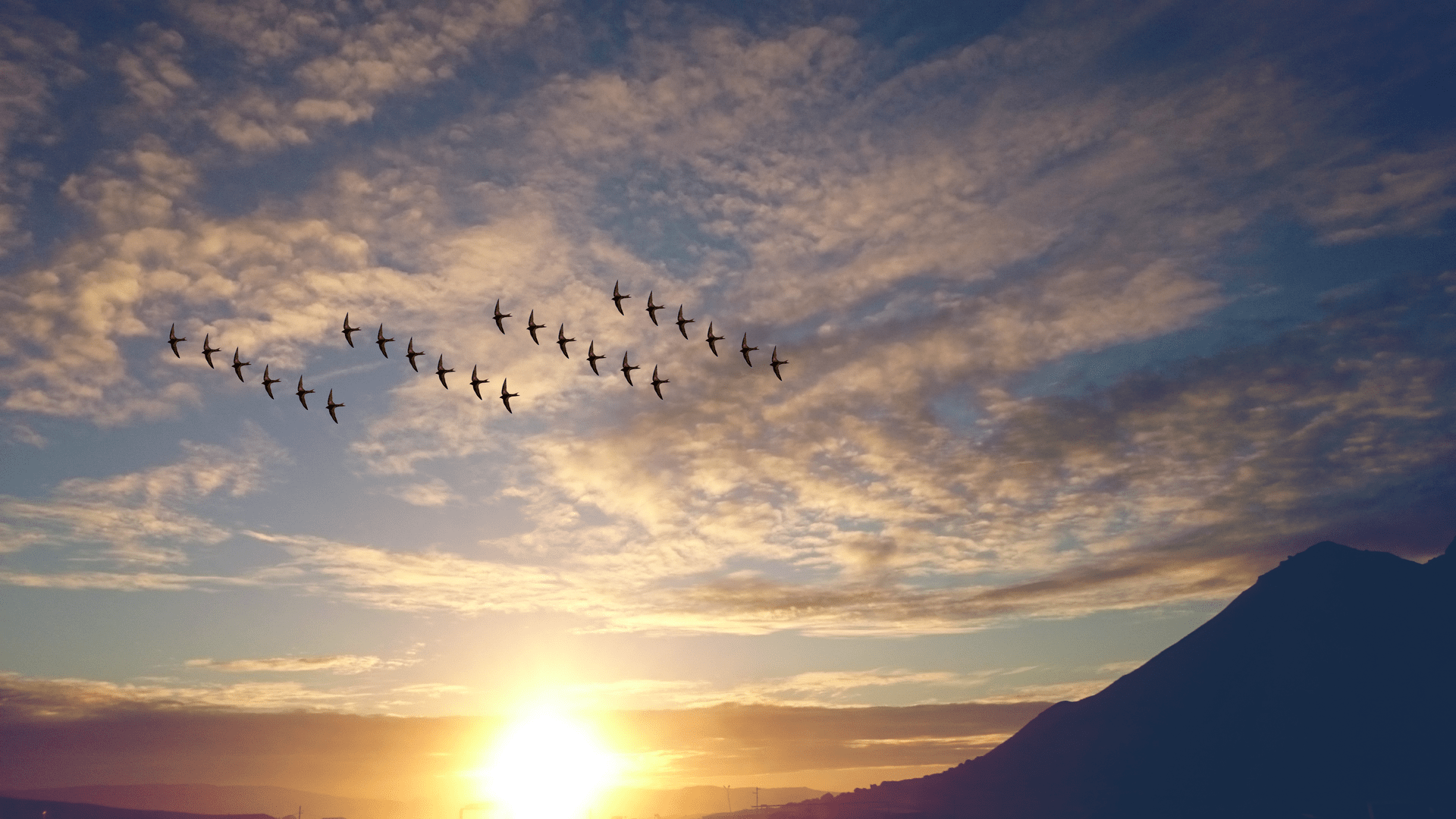AGENDA 2030: a global commitment to sustainable development
March 2025

CAE’s mission is to contribute to creating a world that is more prepared to the risks that communities face in relation to multiple natural events, thanks to our unique mix of expertise, innovation and commitment. The company continuously invests in developing reliable, innovative and interoperable technologies to protect the local area and safeguard the population. In carrying out its activities, CAE strives to ensure sustainable development, in line with the requirements of the 2030 Agenda: an action programme for people, planet and prosperity, signed in 2015 by the governments of the 193 countries that form the United Nations, and approved by the UN General Assembly. The agenda defines 17 goals - Sustainable Development Goals (SDGs) - framed within a broader programme of actions consisting of 169 associated environmental, economic, social and institutional targets or goals to be achieved by 2030. The set goals have global validity, they concern and involve all countries and components of society, from private companies to the public sector, from civil society to information and cultural operators. In this context, CAE is also committed to playing its part and is already active in at least 12 of the 17 goals, some examples of which are given below.
1. NO POVERTY: end poverty in all its forms everywhere.
CAE supported the initiative promoted by the “Cardinal Lambertini” Rotary Club in Poggio Renatico to create a new building for the Nguyet Bieu orphanage, in one of the least developed provinces of Vietnam. The initiative aims to alleviate the suffering of a small community of orphans housed in a convent of Catholic nuns.
2. ZERO HUNGER: end hunger, achieve food security and improved nutrition and promote sustainable agriculture.
CAE builds and supplies agrometeorological systems to help farmers manage water resources. In Sierra Leone, for example, an agrometeorological station and a PG4i stand-alone rain gauge were provided in order to participate in a project funded by Action Against Hunger, an association whose main goal is to create a better way to tackle hunger, and are therefore constantly looking for more effective solutions for long-term change. It is provided as part of a food security programme and addresses the root causes of hunger by addressing problems of production, access and income, and is one of a wide range of activities aimed at supporting and strengthening agricultural production and improving access to sustainable food sources. The data provided will therefore be useful in developing local agriculture, and in a country where 63% of people have food problems, this can only be an important step forward.
3. GOOD HEALTH: ensure healthy lives and promote well-being for all at all ages.
At CAE, we pay the utmost attention to the well-being of people and their families. To mention some concrete actions, we can refer to regulation of smart working, the welfare plan to redistribute company profits, supplementary health insurance and the organisation of informal occasions outside work. Good relations among colleagues and an exchange of ideas are fundamental to the company, which is why spaces have been created to foster them, such as the in-house canteen and the relaxation room equipped with cards, books, table football and Xbox. Going into the details of health in the strict sense, we cannot fail to mention supplementary health insurance, administration of free flu vaccinations by the company physician for those who want them, and, during the Covid period, free periodic swabs for those who wanted them.
4. QUALITY EDUCATION: ensure inclusive and equitable quality education and promote lifelong learning opportunities for all.
CAE is always available to provide training on hydrogeological instability prevention in or for schools. Presentations were made at and/or on-site for secondary schools, universities and Master's courses to raise awareness of climate change issues, present state-of-the-art technologies and show possible job opportunities in the environmental field.
Some examples: Politecnico di Milano, Bologna Business School, Department of Mathematics and Geosciences, University of Trieste, AMPRO, International Summer School of Alta Scuola, Future Responsible Citizens, Miane and Alleghe Citizens' Observatory, Alberghetti Imola Secondary School, ITIP Bucci Faenza.
5. GENDER EQUALITY: achieve gender equality and empower all women and girls.
As described in full in the next article in this CAE Magazine, the company has always been committed to rewarding merit and talent, and since 2024 has formalised this commitment by also obtaining the UNI/PdR 125:2022 gender equality certification.
6. CLEAN WATER AND SANITATION: ensure availability and sustainable management of water and sanitation for all.
CAE specialises in implementing water quality monitoring systems to prevent risks from water pollution. An example of this is the system for reservoirs in Sardinia. These are eutrophic lakes where the water quality is measured at different depths to identify the best take-off level for drinking water. In addition, solutions were provided for monitoring surface water quality in Basilicata, Campania, Molise and the river Po. Last but not least, in Switzerland, we provided rain gauges for a study to see how rainfall affected groundwater quality. In addition, hydrological monitoring is one of CAE's core businesses, and the networks provided to administrations allow them to better manage water resources in emergencies and during scarcity, including at an inter-regional level.
7. AFFORDABLE AND CLEAN ENERGY: ensure access to affordable, reliable, sustainable and modern energy for all.
Today, the topic of energy is hotter than ever, and the quality of solar radiation data is crucial in the energy field. Africa, with its temperatures and particular geographic location, is one of the most suitable continents for solar energy production. That is precisely why it has several photovoltaic plants, including one in Balama, Mozambique, which has been equipped with two CAE weather stations to control production quality, monitor the efficiency of the installed systems, and predict what the system output will be under different weather conditions and therefore sky coverage.
We provide systems to monitor 30 km of canals that divert and conduct water to two hydroelectric power stations belonging to CVA (Compagnia Valdostana delle Acqua), whose main mission is clean energy production. This company transforms the power of water, sun and wind into 2.9 billion kWh per year, while preserving the land and natural ecosystem.
Ninety per cent of the installed stations are powered by solar panels, and soon this will also be true for the CAE headquarters for which an energy efficiency improvement project is being initiated, and where all lighting points have already been replaced with low-energy LEDs.
8. DECENT WORK AND ECONOMIC GROWTH: promote sustained, inclusive and sustainable economic growth, full and productive employment and decent work for all.
In addition to implementing all the initiatives described in point 3, CAE consistently invests in training, which allows people to grow professionally and increase their skills. Furthermore, taking into account the aptitudes and aspirations of each individual, the principles of job rotation are applied, which allows people to increase their skills and in some cases enables career advancement.
Last but not least, the company is investing in office reorganisation, purchasing new furniture and renovating workstations.
9. INNOVATION AND INFRASTRUCTURE: build resilient infrastructure, promote inclusive and sustainable industrialization and foster innovation.
As mentioned in point 7, an energy efficiency improvement project is being initiated for CAE's headquarters, which, in addition to installing a photovoltaic plant, includes a series of investments in new technologies that will lead to electricity consumption savings of 99,600 kWh/year and 5,900 Smc/year less natural gas.
All the technologies developed and proposed by CAE are robust and durable, and are designed to integrate into the environment they monitor. These are innovative instruments capable of great performance while maintaining minimal consumption, and in most cases, the systems can operate for over 30 days even without irradiation.
Innovation is part of the payoff for CAE, which aims to innovate in order to create a safer world. It therefore develops technologies to mitigate risks from extreme weather events and more. To do this, it collaborates with universities and research institutes.
11. SUSTAINABLE CITIES AND COMMUNITIES: make cities and human settlements inclusive, safe, resilient and sustainable.
CAE systems are designed to minimise the number of deaths and the number of people affected by disasters, including water-related disasters. Real-time data provides authorities with the information they need to generate alert bulletins and act promptly in the event of an emergency. In addition, historical data can be used to analyse local areas and plan actions for the future. Last but not least, local warning systems are designed to immediately signal local danger when certain thresholds are exceeded. These systems are also capable of inhibiting traffic in the identified risk area and taking specific actions to save lives.
CAE is also involved in several smart city projects, such as the one for the city of Turin.
13. CLIMATE ACTION: take urgent action to combat climate change and its impacts.
Again, this is CAE's core business, and the systems we have built and supplied are designed to reduce risks from hydro-geological instability, extreme weather events, forest fires... events that are increasingly frequent and intense precisely because of climate change. The fight against the climate change is crucial, CAE knows this and does its best to contribute directly and indirectly. To do so, it raises awareness and provides training on these issues to educational institutions, and also takes part in specific events and publishes the CAE Magazine.
15. LIFE ON LAND: Protect, restore and promote sustainable use of terrestrial ecosystems, sustainably manage forests, combat desertification, and halt and reverse land degradation and halt biodiversity loss.
CAE also makes systems for early detection of forest fires, with the aim of enabling the authorities to act as quickly as possible to reduce the amount of burnt land that leads to the destruction of entire habitats. The company is also participating in a project with the CNR in connection with early detection of fires in the Arctic, where global warming contributes increasing both the fuel that can burn and the opportunities for ignition, and fires today destroy hectares and hectares of vegetation, generating very high carbon emissions.
CAE will continue to work in this direction to do more and more, with the certainty that everyone's contribution is important.
Back to the news index
